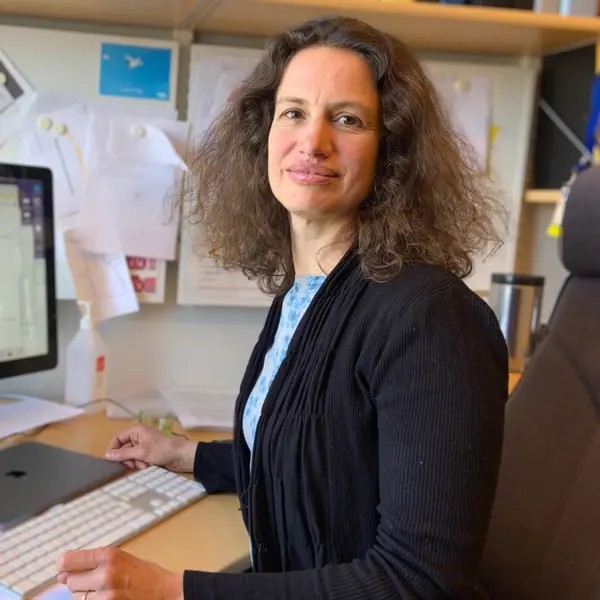Here we present a some of our researchers. Get to know the people behind the research and find out what drives them.

Batteries of the future in focus for Distinguished Professor grant
What will be significant of the batteries of the future? This is the focus of Patrik Johansson's research project, which has been granted funding within the Swedish Research Council's Distinguished Professor Programme. The grant of 47.5 million SEK extends over a ten-year period. “The long time span opens up for greater risk-taking and provides the opportunity to work long-term. These are highly important factors for conducting research,” says Patrik Johansson.

Loves knowledge and the dynamics of a team
Marianna Ivashina is an antenna researcher who is passionate about continuous learning. She enjoys defining research programmes with interdisciplinary challenges and engagement across academic and industry domains. As the director of a competence center, she has the opportunity to collaborate with partners in both worlds. "I love looking into the future and doing it together in a team with different skills."

The canary in the coal mine – his research predicts future resistance threats
Antibiotic resistance is a growing global threat to public health and modern medicine. In Johan Bengtsson-Palme’s research group, efforts are focused on identifying new forms of resistance to prevent them from spreading in society.

Bacterial defence mechanisms targeted for treatment
In addition to the urgent need for new antibiotics, alternative strategies are required to tackle the problem of antibiotic resistance. Michaela Wenzel, Associate Professor at Chalmers University of Technology, is investigating bacterial defences against external stress to make these a target for efficient antibiotic treatments.

Daniel Persson develops the math of future AI
Daniel Persson, soon appointed professor at the Department of Mathematical Sciences in Gothenburg, has gone from studying the fundamental laws of the universe to leading research in AI and machine learning. We met him to get a glimpse of his work - and the mathematics behind AI.

New AI diagnostics can help prevent the spread of resistant bacteria
Antibiotic resistance is a serious global threat to public health. Anna Johnning and Erik Kristiansson at the Department of Mathematical Sciences, Chalmers University of Technology and the University of Gothenburg, are researching new ways to detect and map resistant bacteria and prevent their spread.

Leif Asp is this year's William Chalmers lecturer
Imagine if we could combine the strength of a load-bearing structure with the ability to store energy in a single material. In this year's William Chalmers lecture on November 5, “How can multifunctional materials enable massless energy storage?” Leif Asp discusses this concept.

Chalmers Professor new Honorary Fellow of the Royal Society of Chemistry
Pernilla Wittung-Stafshede, Professor of Chemical Biology at Chalmers University of Technology, has been appointed as an Honorary Fellow by the Royal Society of Chemistry, Great Britain. She is admitted as a recognition of her research on the role of proteins in degenerative diseases and cancer, her involvement in the Nobel Committee for Chemistry, and her commitment for gender equality in academia.

Chalmers Professor on Highly Cited Researchers list
Jens Nielsen, Professor of Systems Biology, is on the Highly Cited Researchers list − a list of the most cited, and thereby most influential, researchers in the world.

"Technology development and society must go hand in hand"
Knut Åkesson is Professor of Automation at the Department of Electrical Engineering at Chalmers and conducts research in industrial automation. He is also the program director for the Automation and Mechatronics degree program, as well as research leader in automation activities in the Wingquist Laboratory. We talked with him about automation and why it's important. But also, about his interest in problem solving as well as the importance of education and young people's interest in science and technology.

Researching for new knowledge about the universe and the climate
The work of Chalmers Areas of Advance is interdepartmental and for Information and Communication Technology Area of Advance (ICT), this could be supporting research on ICT tools. But what does this actually mean? We have met Jan Stake, Professor of Terahertz Electronics and Head of Division of Terahertz and Millimetre Wave Technology at the Department of Microtechnology and Nanoscience (MC2), to find out more about his research and how it links to ICT.

Research on the impact of human activities on the marine environment
Anna Lunde Hermanssons research has attracted a lot of attention. On Friday 11 October sche defends her thesis Holistic assessment of ship scrubbers, with emphasis on the marine environment.

“There are always new ways to attack, we must stay ahead with defences!”
Cybersecurity is more important than ever in an increasingly digitalized society. Andrei Sabelfeld never has a boring moment at work. As a cybersecurity researcher, he operates in a constantly evolving field.

With a mind set on nano
She’s a professor of applied quantum physics, a mother of three and speaks five languages. As the leader of the interdisciplinary Nano Excellence Initiative, Janine Splettstoesser now wants to create one of Europe's top nano-centers with the goal of addressing the biggest challenges facing the society. But when it comes to the proudest career moments, she’d rather speak about her students. "When a PhD student gives a really good defense on their dissertation and can continue to work on what they really like and subsequently grow as a researcher. That makes me really proud.”

AI can detect toxic chemicals
Researchers from Chalmers University of Technology have developed an AI-based method that simplifies the identification of toxic chemicals. The method, which was developed by researchers Mikael Gustavsson and Erik Kristiansson, can be used to identify dangerous chemicals and assess their impact on the environment quickly and efficiently. The method is described in a scientific article published in the journal Science Advances.